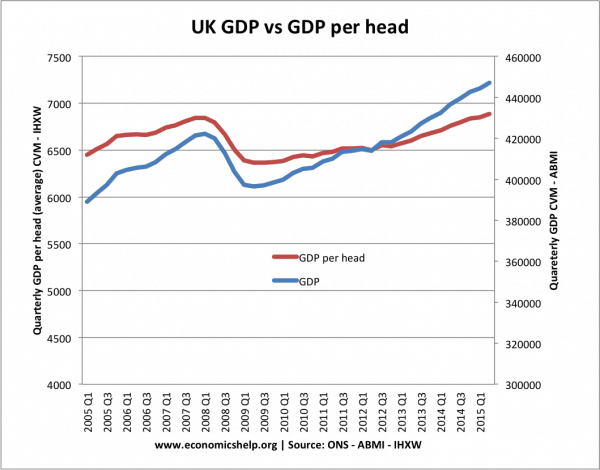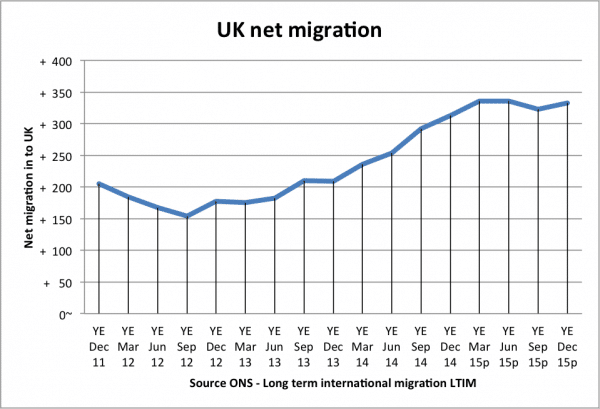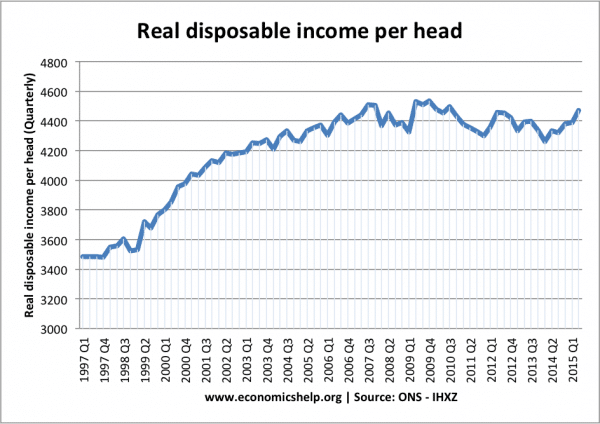The UK saw net migration of 330,000 in the last year. If net migration were to fall significantly – how would this affect the UK economy?
Net migration is generally difficult to predict, but there are good reasons to assume this is likely to fall in future years. Net migration will likely fall because:
- Climate post-Brexit has seen a rise in racist incidents and hostility towards migrants. This will deter many from coming, and may even encourage some migrant workers to move elsewhere.
- Lower UK economic growth and higher unemployment will reduce economic incentive of people to come and work in the UK.
- UK main political parties seem committed (at the moment) to ending free movement of labour, whatever the cost in terms of losing full access to Single Market.
If the UK were to see a fall in immigration, how would that affect the economy?
1. Lower economic growth. Net migration, ceteris paribus, leads to higher real GDP. This is because net migration, with more people of working age coming to the UK, increases the labour supply and increases aggregate demand (migrants spend in UK). If migration falls, then this boost to real GDP will be lost, and we will have a relatively lower real GDP.

However, it is also worth considering real GDP per capita. If you have an extra million people, then real GDP will rise, but real GDP per capita could well stay the same. In recent years, UK economic growth has been magnified by population growth, if you look at economic growth per capita, then the increase in average living standards is much slower.
You could argue that the recent years of high rates of net migration have failed to increase real GDP per capita, and therefore cutting net migration will have no impact on average living standards – which have been static in recent years.
However, we have to be careful about making direct correlations – that it was high migration which led to stagnant real GDP per capita growth. Low real GDP per capita growth post 2008 crisis could be determined by several factors, such as austerity, low productivity growth, globalisation and low global growth.
It depends how disruptive the cut in net migration is. If net migration is cut aggressively, but the UK doesn’t have the skilled workers to fill vacancies, then this will adversely affect labour productivity and cut harm real GDP per capita. However, if cut in net migration doesn’t adversely affect firms and business, then the effect will be more positive.
2. Skills shortage
The UK has a skills shortage in many industries and sectors. These include highly skilled professions, such as doctors, nurses and plumbers. A fall in net migration could cause more vacancies in these areas. This could lead to waiting lists rising in the NHS and a shortage of plumbers, builders.
However, supporters of cutting net migration argue that we can have the best of both worlds, allowing skilled workers to still come, only stopping ‘unskilled workers’. In this case, we can pick and choose which migrants come.
However, this kind of selective immigration policy will be difficult to implement in practise and may require much more stringent border controls and checks. Also, If UK leaves the EU, it may make the UK less attractive for skilled workers that we want to attract.
Another argument is that the UK should be self-sufficient in skilled labour. If we need to employ migrant labour to fill labour shortages, a better solution is to increase training for these jobs. However, this is easier said than done. It will take a long time, and also may require changing cultural attitudes – e.g. in UK graduate degree is generally seen as more desirable than practical vocational qualifications, such as plumbing and electrician.
3. Shortage of temporary / part-time unskilled workers.
The UK economy benefits from flexible flows of migrant labour to fill seasonal vacancies, such as agricultural work – picking and packing vegetables at harvest time. EU-born workers account for just 5% of the country’s workforce, but in agriculture it’s 65% (FWI), Cutting net migration is likely to lead to a shortage of these relatively unpopular jobs. This could lead to higher costs for firms and higher food prices. Farmers may face a double hit because they find, outside EU, exports to Europe are more difficult. See: Farmers worry about loss of Eastern Europe labour.
On the other hand, you could argue that maybe wages are too low, and in the absence of migrant labour, farms will have to push up wages to attract native born workers.
4. Higher wages.
Many who support cutting migrant labour, hope that cutting the labour supply will lead to higher wages. The argument is that Eastern Europeans are willing to work for low wages and poor conditions causing downward pressure on wages. Therefore cutting this migrant labour will enable wages to rise.
However, this is not certain. Reports have suggested that net migration only has relatively small or non-existent effects on pushing down wages.
“Empirical research on the labour market effects of immigration to the UK finds little overall adverse effects of immigration on wages and employment for the UK-born…The less skilled are closer substitutes for immigrants than the more highly skilled. So any pressures from increased competition for jobs is more likely to be found among less skilled workers. But these effects are small”
(Empirical research on the labour market effects of immigration to the UK finds little overall adverse effects of immigration on wages and employment for the UK-born…The less skilled are closer substitutes for immigrants than the more highly skilled. So any pressures from increased competition for jobs is more likely to be found among less skilled workers. But these effects are small (Manacorda et al, 2011; Dustmann et al, 2005, 2013; Nickell and Saleheen, 2008).
Outside the EU, lower investment and deterioration in trading conditions could push down wages to counteract any impact of a decline in labour supply. Aside from levels of net migration, wages are determined by many other factors, monopsony power of firms, economic growth, productivity growth e.t.c. See determination of wages
What we might see is rise in some particular skilled jobs.
5. Fiscal impact of cutting net migration.
Net migration makes a positive impact on public finances (young workers generally pay tax, receive less pensions / health care). The popular impression of migrants coming to live on benefits are misplaced. In recent years, net migration has helped counteract the UK’s ageing population. A sharp cut in migration will lead to a loss of these net contributions and expose the UK’s demographic ‘timebomb’. In addition, the fall in migration will affect economic growth; lower economic growth will negatively impact on public finances.
6. Housing market. A housing market struggling to keep pace with rising demand, may see some relief from a slower growth in the population. Combined with lower economic growth, it could even precipitate a fall in house prices and cheaper rents which improve living standards for ‘generation rent‘.
On the other hand, the home-building industry may find it harder to employ skilled labour. But, I’m doubtful of this, the main block to home-building in the UK, is not shortage of labour, but finding land to build houses on.
7. NHS waiting lists? Cutting migration will do nothing to solve the long-term pressures on the NHS. – Ageing population, increased range of expensive medicines, higher expectations, health care spending being cut (as a % of GDP – real spending has been rising).
Those arguing to leave the EU claim the contributions the UK used to send the EU (£9.9bn net) can now go on the NHS. Though no-one is now committing to the previous promise of £350m a week – £100m seems best people dare to claim. However, with a deterioration of public finances, the government may have less room for manoeuvre than it would like.
Related


